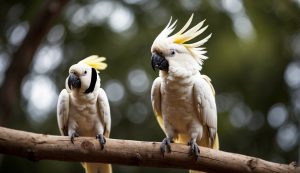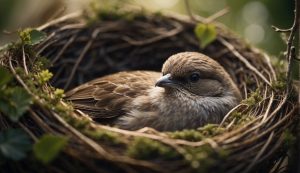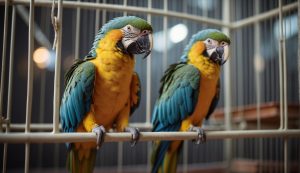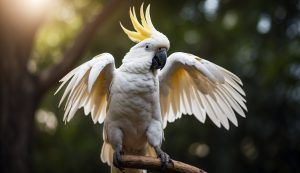African Grey Parrot Diet: Essential Nutrients for Optimal Health
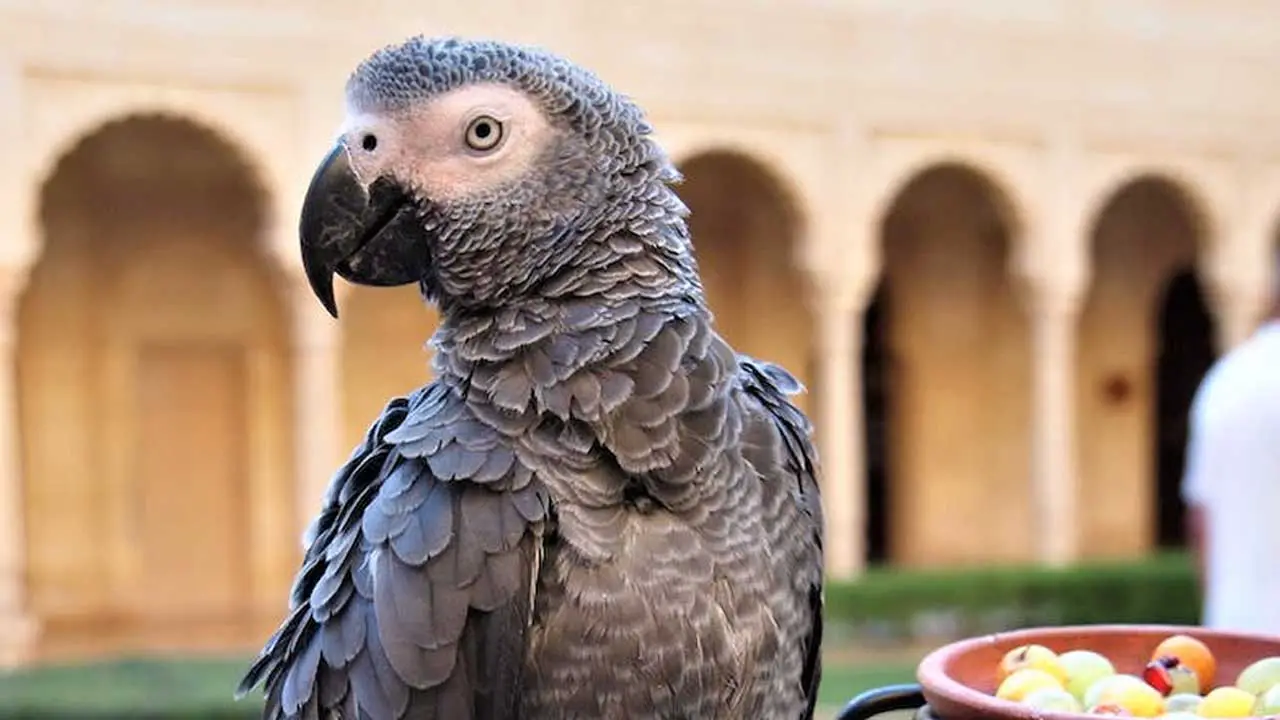
African Grey Parrots are one of the most popular pet birds, and for good reason. These intelligent and social birds are known for their incredible ability to mimic human speech and their playful personalities. However, owning an African Grey Parrot comes with a great deal of responsibility, including providing them with a healthy and balanced diet.
In the wild, African Grey Parrots have a varied diet that includes fruits, leaves, insects, bark, and flowers. In captivity, it’s important to replicate this diverse diet to ensure that they receive all the necessary nutrients. While there are many different types of food available for pet birds, it’s important to choose a balanced and nutritious diet that meets their specific needs.
Feeding your African Grey Parrot a healthy diet is essential for their overall health and wellbeing. In this article, we will explore the different types of foods that African Grey Parrots can eat, and provide tips on how to create a balanced diet that meets their nutritional needs. Whether you’re a new or experienced bird owner, understanding the importance of a healthy diet is crucial for the health and happiness of your African Grey Parrot.
Table of Contents
Basic Nutritional Needs
African Grey Parrots require a balanced diet to maintain their health and well-being. Their diet should include a variety of foods, including fresh fruits, vegetables, grains, and nuts. It is important to note that a diet consisting of only seeds is not sufficient for their nutritional needs.
Macronutrients
Macronutrients are nutrients that are needed in large quantities to provide energy and support growth. African Grey Parrots require a diet that is high in carbohydrates, moderate in protein, and low in fat. Carbohydrates can be found in fruits, vegetables, and grains, while protein can be found in nuts and legumes. Fat should be limited in their diet, as it can lead to obesity and other health problems.
Micronutrients
Micronutrients are nutrients that are needed in small quantities to maintain overall health. African Grey Parrots require a variety of vitamins and minerals to support their immune system, maintain healthy bones, and promote overall well-being. Some important micronutrients for African Grey Parrots include:
- Vitamin A: Found in dark leafy greens, carrots, and sweet potatoes, vitamin A is important for maintaining healthy eyesight and promoting a healthy immune system.
- Vitamin D: African Grey Parrots require vitamin D to absorb calcium and maintain healthy bones. Vitamin D can be obtained through exposure to sunlight or through fortified foods.
- Calcium: Calcium is important for maintaining healthy bones and teeth. African Grey Parrots require a diet that is high in calcium, which can be found in dark leafy greens, fortified foods, and calcium supplements.
- Iron: Iron is important for the production of red blood cells and the transport of oxygen throughout the body. Iron can be found in fortified cereals, dark leafy greens, and nuts.
Providing a balanced diet that includes both macronutrients and micronutrients is essential for the health and well-being of African Grey Parrots. Consult with a veterinarian or avian nutritionist to ensure that your parrot is receiving a diet that meets their specific nutritional needs.
Food Options For African Grey Parrots
Pellets
Pellets are a convenient and balanced food option for African Grey Parrots. They come in different sizes and flavors, and they provide a complete and balanced diet that meets most of the bird’s nutritional needs. Pellets are made of different ingredients, including grains, seeds, vegetables, and fruits. They are designed to provide a consistent level of nutrients and reduce the risk of selective feeding, which can lead to malnutrition.
It is essential to choose high-quality pellets that are fresh and free of contaminants. Pellets should make up about 60-70% of an African Grey Parrot’s diet. However, it is important to note that pellets should not be the only food source for the bird.
Fresh Foods
Fresh foods are an essential part of an African Grey Parrot’s diet. They provide variety, texture, and natural nutrients that pellets cannot offer. Fresh foods include vegetables, fruits, and sprouts. Vegetables that are good for African Grey Parrots include kale, peppers, zucchini, peas, green beans, collard greens, and carrots. Fruits that are good for them include apples, bananas, grapes, and berries.
It is important to clean and chop the fresh foods into small pieces before feeding them to the bird. Fresh foods should make up about 20-25% of an African Grey Parrot’s diet. It is important to offer a variety of fresh foods to ensure that the bird gets a balanced diet.
Supplements
Supplements are not necessary if the bird is eating a balanced diet of pellets and fresh foods. However, some owners may choose to provide supplements to ensure that their bird is getting all the necessary nutrients. Common supplements for African Grey Parrots include calcium, vitamin D, and omega-3 fatty acids.
It is important to consult with a veterinarian before providing any supplements to the bird. Over-supplementation can be harmful and lead to health problems.
In conclusion, African Grey Parrots require a balanced diet that includes pellets, fresh foods, and supplements (if necessary). It is important to provide a variety of foods and consult with a veterinarian to ensure that the bird is getting all the necessary nutrients.
Foods to Avoid
African Grey parrots are sensitive to certain foods, and consuming them can lead to health problems. It’s important to know which foods to avoid and to keep them away from your parrot’s reach. Here are some of the foods that you should avoid feeding your African Grey parrot:
- Avocado: Avocado is toxic to birds and can cause heart and respiratory problems.
- Chocolate: Chocolate contains theobromine, which can be fatal to birds. It can cause seizures, heart failure, and death.
- Caffeine: Caffeine can cause heart problems, hyperactivity, and death in birds.
- Salt: Too much salt can lead to dehydration and kidney problems in birds.
- Alcohol: Alcohol can cause liver damage, seizures, and death in birds.
- Dairy products: Birds are lactose intolerant, and dairy products can cause digestive problems.
- Onion and garlic: These foods can cause anemia in birds.
- Meat: Meat can contain harmful bacteria and parasites that can cause infections in birds.
It’s also important to avoid feeding your African Grey parrot any food that has been treated with pesticides or herbicides. These chemicals can be toxic to birds and can cause health problems.
By avoiding these foods and being mindful of what you feed your African Grey parrot, you can help ensure that your feathered friend stays healthy and happy.
Example Feeding Schedule for African Grey Parrots
African Grey parrots require a balanced diet that includes a variety of foods. Creating a feeding schedule can help ensure your parrot gets the nutrients they need to maintain good health. Here is a sample feeding schedule:
| Time | Food |
|---|---|
| 8:00 am | Pellets or Complete Food |
| 10:00 am | Fruits and Vegetables |
| 12:00 pm | Pellets or Complete Food |
| 2:00 pm | Fruits and Vegetables |
| 4:00 pm | Pellets or Complete Food |
| 6:00 pm | Fruits and Vegetables |
It is important to remember that this is just a sample schedule and can be adjusted to fit your parrot’s needs. Be sure to monitor your parrot’s weight and adjust the amount of food accordingly. Also, make sure to provide fresh water at all times.
When introducing new foods to your African Grey parrot, do so gradually to avoid digestive upset. Offer a small amount of the new food and observe your parrot’s reaction. If they show signs of liking it, gradually increase the amount over time.
Finally, be sure to clean your parrot’s food and water dishes daily to prevent the growth of harmful bacteria. This will help ensure your parrot stays healthy and happy.
Conclusion
Feeding an African Grey Parrot requires a proper balance of carbohydrates, proteins, fat, vitamins, minerals, and water. Fresh fruits and vegetables should be a part of their diet, along with high-quality pellet food. It is important to avoid foods that are high in sugar or salt, as these can be harmful to your bird’s health.
When feeding your African Grey Parrot, it is important to provide a variety of fresh fruits and vegetables to ensure they are receiving all necessary nutrients. Some recommended fruits and veggies include pears, oranges, apples, bananas, carrots, sweet potatoes, green beans, kale, and spinach.
Additionally, it is important to provide your bird with access to fresh water at all times. Avoid feeding your parrot processed foods, sugary treats, or any food that is high in fat or salt. A healthy diet will help ensure that your African Grey Parrot lives a long and healthy life.

